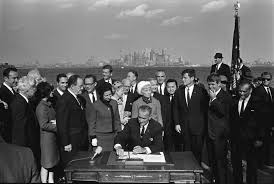 The 50th Anniversary of the Immigration Act of 1965: A Half Century of Mass Immigration with No Defined Public Interest, Says FAIR
The 50th Anniversary of the Immigration Act of 1965: A Half Century of Mass Immigration with No Defined Public Interest, Says FAIR
Fifty years ago this week, President Lyndon Johnson signed the Immigration Act of 1965 into law with the laudable goal of ending overt national origins discrimination in our immigration policy. Beyond that narrow goal, the 1965 Act has unleashed the most massive and sustained wave of immigration in our history that serves no definable public interest objectives, says the Federation for American Immigration Reform (FAIR).
In the half century since President Johnson signed the bill into law, some 59 million immigrants have settled in the U.S., increasing the foreign born population of the country from 9.6 million to 45 million today. Immigrants and their children have added 72 million people to our population, or about 55 percent of the increase since 1965. Moreover, the vast majority of immigrants who have been admitted over the past half-century have entered as a result of unintended family chain migration policies unleashed by the 1965 Act.
A review of the debates that took place on the floor of Congress reveals that none of the assurances made by the backers of the Act regarding the levels of immigration, or its effect on American society, turned out to be correct. In a speech on the floor of the Senate, Edward Kennedy (D-Mass.) stated:
“First, our cities will not be flooded with a million immigrants annually. Under the proposed bill, the present level of immigration remains substantially the same … Secondly, the ethnic mix of this country will not be upset … Contrary to the charges in some quarters, [the bill] will not inundate America with immigrants from any one country or area, or the most populated and deprived nations of Africa and Asia … In the final analysis, the ethnic pattern of immigration under the proposed measure is not expected to change as sharply as the critics seem to think.”
Kennedy’s wildly inaccurate assertions were echoed by virtually every congressional and executive branch official who urged passage of the 1965 Act. Every attempt to tweak the law, or to establish new “limited” immigration programs have consistently underestimated the levels of actual immigration produced.
In addition to being wrong about the volume and the composition of the immigration flow to the United States, the bill created endless flows of family chain migration that continues to admit millions of immigrants without regard to education and skills. As a direct result of policies, more than half of all immigrant-headed households in the U.S. access some form of welfare.
“By any objective standards, the 1965 Immigration Act would have to be considered an abject failure, and it is incumbent upon today’s leaders to fix a law that has produced countless unintended consequences that threaten our nation’s future,” said Dan Stein, president of FAIR. “The law has resulted in reckless population growth, growing dependence of the social welfare system, and overwhelmed the country’s capacity to assimilate immigrants and their children into the social, cultural and economic mainstream.”
Even more alarming are the projected consequences of another half century of immigration governed by the failed 1965 Act. According to the Pew Hispanic Center, immigration is likely to account for 88 percent of population growth by 2065. Immigration and births to immigrants are expected to add 103 million people to our population as it reaches a projected 441 million people 50 years from now.
“Mass immigration is radically transforming our nation without any identifiable public interest that is being served,” Stein charged. “Fifty years into this failed experiment, no one in a position of leadership is even asking if the level of population growth resulting from 1965 Act is beneficial, or sustainable into the future. No one is questioning the potentially catastrophic consequences of a policy under which half the people we admit require public assistance to get by. While everyone acknowledges that skills and education are essential to success in the 21st century, few people in leadership are willing to challenge an immigration policy that admits millions of people who have little education and skills.
“Today, the 1965 law remains a sacred cow to certain political interests. But despite its noble intentions, the law has created an unmanageable situation and it needs to be reformed, root and branch, to ensure a single, stable governable limit on overall immigration annually,” Stein continued.
“Most of all, we need to define a public interest objective for immigration and ask ourselves if the law President Johnson signed a half century ago serves our national interests,” concluded Stein.
WASHINGTON, Oct. 1, 2015 /PRNewswire-USNewswire/ — ABOUT FAIR
Founded in 1979, FAIR is the country’s largest immigration reform group. With over 250,000 members nationwide, FAIR fights for immigration policies that serve national interests, not special interests. FAIR believes that immigration reform must enhance national security, improve the economy, protect jobs, preserve our environment, and establish a rule of law that is recognized and enforced.




























